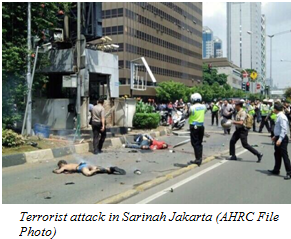INDONESIA: Increasing intelligence agents’ authority will do more harm than good in fighting terrorism
The Asian Human Rights Commission (AHRC) condemns the suicide bombing and explosion that took place in Sarinah shopping center, Jakarta, Indonesia on 14 January 2016. We express our deep condolences to the victims and the families of those who died as a result of the terrorist attack. Approximately 23 people were victims of the explosion, one suicide bomber died after setting off the bomb, and three other perpetrators were shot dead by the police.
 Prior to this recent bomb blast, the AHRC has documented several earlier blasts in Jakarta, such as the blast in Bursa Efek Jakarta (2000), in Plaza Atrimum (2001), in JW Marriot (2003), in Kuningan (2004), and the bomb blast in Mega Kuningan (2009). The terrorist attack on 14 January 2016 has proven that the Intelligence Agency (BIN) and the Indonesian Police (POLRI) do not have good coordination to prevent such attacks and protect Indonesian citizens. The government tends to kill terrorist suspects to eradicate terrorism, rather than arresting and investigating them, in order to gather information and reveal terrorist networks.
Prior to this recent bomb blast, the AHRC has documented several earlier blasts in Jakarta, such as the blast in Bursa Efek Jakarta (2000), in Plaza Atrimum (2001), in JW Marriot (2003), in Kuningan (2004), and the bomb blast in Mega Kuningan (2009). The terrorist attack on 14 January 2016 has proven that the Intelligence Agency (BIN) and the Indonesian Police (POLRI) do not have good coordination to prevent such attacks and protect Indonesian citizens. The government tends to kill terrorist suspects to eradicate terrorism, rather than arresting and investigating them, in order to gather information and reveal terrorist networks.
The AHRC is concerned by the statement made by the head of the BIN after Thursday’s bomb blast, that stronger authority is needed by the intelligence agency to arrest anybody allegedly involved in a terrorist network. Under Law No. 17 of 2011 on the Intelligence Agency, the BIN’s main duty is only to provide information to be used by the police, president, and even the military. The proposal to strengthen BIN’s authority to arrest people is therefore in violation of the law.
Indonesia does not seem to have a comprehensive system to handle terrorist attacks, as seen by the poor handling of clearing the bomb site when the first bomb exploded in Sarinah. The police are not prepared or willing to deal with terrorist attacks in varied circumstances. Furthermore, the ‘deradicalization’ program conducted by the government to ‘rehabilitate’ terrorists cannot succeed with the police continuing to torture suspects and the lack of access to justice and fair trial for victims’ families.
It is therefore essential for the Indonesian Government to develop a comprehensive strategy to prevent and eradicate terrorism, while respecting human rights principles. In the view of the AHRC, increasing the authority of intelligence agents to arrest persons is not part of the solution; on the contrary, it will perpetrate wrongful arrest, torture, and other abuse of power. All steps should be taken to ensure that the Indonesian police, as the country’s law enforcement agency, has the capacity to properly investigate and dismantle the terrorist network involved in the Sarinah attack, rather than spreading speculations without proper investigation.
The AHRC also requests Commission Three and Commission One of the House of Representatives to effectively monitor and evaluate the government program in eradicating terrorism. Independent commissions such as the National Commission on Human Rights (Komnas HAM), the National Police Commission (Kompolnas), and the Indonesian Ombudsman should also be more proactive to ensure that human rights are not violated in eradicating any kind of terrorist attack and network.



